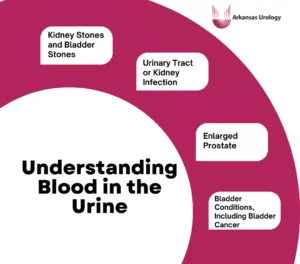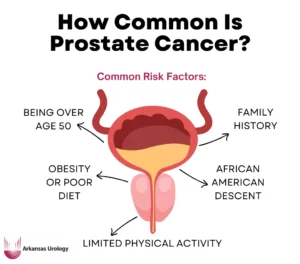Noticing a change in your urine can be concerning. Sometimes the urine may look pink, red, or darker than usual. Other times, blood is found during routine testing even though everything looks normal. At Arkansas Urology, we often see patients who are unsure what this means or how serious it might be.
Blood in the urine, called hematuria, is fairly common and often treatable. However, it should always be checked. This symptom does not always cause pain or other warning signs, which is why it is important not to ignore it. Seeing a urologist helps determine what is causing the problem and what care is needed.
If you have noticed a change in your urine or were told that blood was found during testing, scheduling an appointment is an important next step.
What Is Blood in the Urine?
Blood in the urine happens when red blood cells enter the urinary tract. The urinary tract includes the kidneys, ureters, bladder, and urethra. Healthcare providers use the term hematuria to describe this finding.
Sometimes this condition changes how urine looks. In other cases, blood is only found through laboratory testing. Even a small amount of blood that cannot be seen without a microscope can point to a medical issue that needs attention. Hematuria is a symptom rather than a diagnosis, which means further testing is needed to find the cause.
Types of Hematuria
Healthcare providers describe hematuria based on whether the blood can be seen.
Gross Hematuria
Gross hematuria means blood is visible in the urine. The urine may look pink, red, or brown. Even if this happens only once and then goes away, it should still be evaluated. Visible blood can be linked to many different urinary conditions.
Microscopic Hematuria
Microscopic hematuria means blood is present but cannot be seen with the naked eye. It is often found during a routine urine test. Many people with microscopic hematuria do not have symptoms, but follow-up testing is important to decide whether treatment or monitoring is needed.
Arkansas Urology evaluates both types of hematuria to help identify the source of bleeding and guide care.
Common Causes of Blood in the Urine
There are many reasons blood may appear in the urine. Some causes are temporary, while others need medical treatment. A urologist helps determine which condition may be responsible.
Kidney Stones and Bladder Stones
Kidney stones are a common cause of blood in the urine. Stones can irritate the lining of the urinary tract and cause bleeding. Blood may appear with or without pain, and discomfort can range from mild to severe. Bladder stones can cause similar irritation and may also lead to blood in the urine.
Urinary Tract or Kidney Infection
A urinary tract infection can cause swelling and bleeding in the urinary system. Symptoms may include burning during urination, frequent urination, urgency, or cloudy urine. In some cases, the infection can spread to the kidneys and lead to fever, back pain, or feeling generally unwell.
Enlarged Prostate
An enlarged prostate, known as benign prostatic hyperplasia, is common in older men and affects the prostate gland. Benign prostatic hyperplasia, often called BPH, can cause symptoms such as weak urine flow, difficulty starting urination, frequent urination, or trouble fully emptying the bladder.
In some cases, changes in the prostate gland and increased blood vessel growth can lead to bleeding. Testing is important to rule out other prostate conditions, including prostate cancer.
Bladder Conditions, Including Bladder Cancer
Blood in the urine may be linked to bladder problems such as inflammation, growths, or bladder cancer. In these cases, bleeding may happen without pain and may come and go. The risk increases with age and smoking history, which is why unexplained bleeding should always be checked.
Other Possible Causes
Other causes include kidney cancer, kidney injury, certain medications such as blood thinners, recent medical procedures, vigorous exercise, or medical conditions like sickle cell disease. Family history and other risk factors can also increase risk.
When Blood in the Urine Is Urgent
Not every case requires emergency care, but some symptoms should be taken seriously.
Seek urgent or emergency care if blood in the urine happens along with:
-
Severe or ongoing pain
-
Fever or chills
-
Trouble urinating or inability to urinate
-
Blood clots in the urine
-
Dizziness, weakness, or heavy bleeding
If you are unsure how urgent your symptoms are, Arkansas Urology can help guide the next steps for non-emergency concerns.
How a Urologist Evaluates Blood in the Urine
Evaluation of the cause of hematuria focuses on finding where the bleeding is coming from and why it is happening. Your urologist will review your symptoms, medical history, family history, and other risk factors.
Testing may include:
-
A urine test or urine sample to look for red blood cells
-
A urine culture to check for infection
-
Blood tests to check kidney function or signs of kidney injury
-
Imaging tests, such as a CT scan, to look at the urinary tract
Arkansas Urology routinely evaluates both types of hematuria to identify the source of bleeding and guide care, which may include specialized urine testing such as urine cytology when clinically appropriate. Not every patient needs every test. Your healthcare provider will recommend testing based on your situation.
Treatment Depends on the Cause
Treatment depends on what is causing the bleeding. Infections may be treated with medication. Kidney or bladder stones may be monitored or treated based on size and symptoms. Prostate-related causes may need ongoing management. In some cases, especially when only a small amount of blood is found, careful monitoring may be recommended.
Your urologist will explain treatment options clearly and answer questions so you know what to expect.
Why Choose Arkansas Urology
Arkansas Urology provides patient-focused care for people experiencing blood in the urine and looking for clear, reliable health information. Our urologists specialize in conditions of the urinary tract and understand the many possible causes of hematuria.
Patients choose Arkansas Urology because we provide:
-
Care focused on identifying the cause of symptoms
-
Clear explanations of test results and treatment options
-
Personalized care based on symptoms and risk factors
-
Guidance on when urgent or emergency care is needed
We understand that this symptom can be stressful. Our goal is to help you get answers and move forward with confidence.
Take the Next Step
If you have noticed blood in your urine or were told you have microscopic hematuria, scheduling an appointment with Arkansas Urology is an important step for evaluation and follow-up care.
If you are experiencing severe symptoms such as heavy bleeding, severe pain, fever, or difficulty urinating, seek emergency medical care right away.
For non-emergency concerns, Arkansas Urology is here to help guide your care and determine appropriate next steps through a scheduled appointment.




